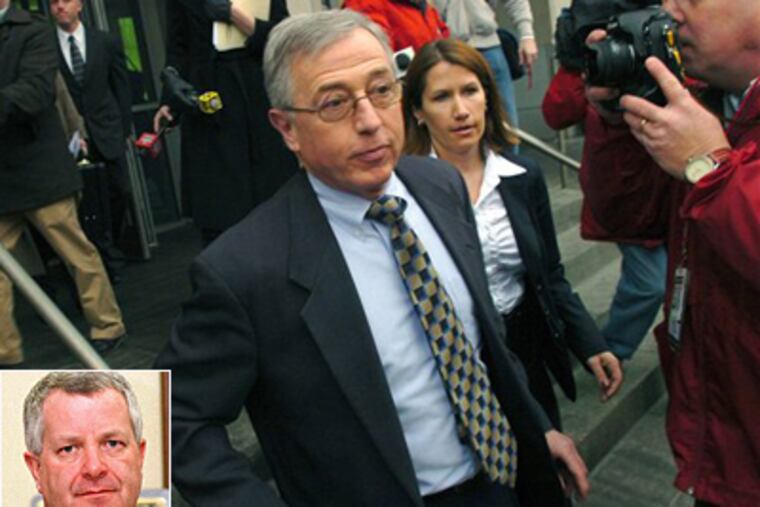Judge may overturn hundreds of cases in Luzerne scandal
The Pennsylvania Supreme Court said yesterday that it would give a judge the discretion to overturn the cases of as many as 1,200 juveniles sentenced by a Luzerne County judge who admitted taking payments from detention centers to which he sentenced some of them.

The Pennsylvania Supreme Court said yesterday that it would give a judge the discretion to overturn the cases of as many as 1,200 juveniles sentenced by a Luzerne County judge who admitted taking payments from detention centers to which he sentenced some of them.
Calling the unanimous order a first step toward restoring public confidence in the justice system, the court said it applies to first-time offenders convicted of minor crimes who appeared without counsel before Luzerne County Juvenile Court Judge Mark A. Ciavarella Jr. between 2003 and 2008.
"Today's order is not intended to be a quick fix," Chief Justice Ronald D. Castille said in a statement. "It's going to take some time, but the Supreme Court is committed to righting whatever wrong was perpetrated on Luzerne's juveniles and their families."
In a report to the court filed March 13, Berks County Senior Judge Arthur E. Grim said his investigation uncovered "routine deprivation of children's constitutional rights to appear before an impartial tribunal and have an opportunity to be heard."
The court appointed Grim to review the cases of an estimated 2,500 juveniles Ciavarella sentenced. About half of those cases could be affected by the court's order. Children who got into trouble later and were adjudicated delinquent for another offense are not subject to the ruling.
Grim will review the cases individually to determine if they meet the court's conditions, a process that could take weeks.
"We intend to vacate and expunge as we go along, realizing that a delay can cause a problem," said Grim.
Ciavarella and another former Luzerne County judge, Michael T. Conahan, pleaded guilty this year to taking $2.6 million in secret payments from the former owner of two juvenile detention centers.
The judges admitted that they helped the centers, PA Child Care L.L.C. and Western PA Child Care L.L.C., secure a county contract worth millions of dollars. Ciavarella routinely sentenced children to the centers.
Both judges agreed to spend 87 months in prison. They are free on bond while a federal court considers the plea deal.
"We are very pleased that the court has issued this order expunging hundreds of cases of juveniles who suffered at the hands of Ciavarella," said Marsha Levick, legal director for the Philadelphia-based Juvenile Law Center, which asked the Supreme Court to intervene.
"We think this is just the beginning," said Levick.
The ruling is the first good news for juvenile defendants victimized by corruption at the Wilkes-Barre courthouse. An investigation has already netted four guilty pleas and prompted the county courts clerk to cooperate with federal authorities.
A Luzerne County probation official, Sandra Brulo, 56, pleaded guilty yesterday to altering a court document in a juvenile case. She also agreed to cooperate with federal prosecutors.
After federal prosecutors charged Ciavarella in January, the law center filed a petition with the Supreme Court alleging that Ciavarella routinely violated the rights of juveniles by allowing them to appear before him without counsel.
The court had denied a 2008 request that the law center made before the scandal became public.
Ciavarella, the center said, failed to inform defendants of their right to an attorney, in violation of a state law requiring that juveniles understand what they are doing before choosing to give up their right to counsel.
In many cases, the juveniles said they did not realize they were admitting to crimes. The gravity of the situation became clear to them only as they were being shackled and taken away to detention centers.
One of those was Charlie Balasavage, a 16-year-old accused of buying a scooter that turned out to be stolen. Balasavage said he never got a chance to explain that he purchased the bike from a relative and had no idea it was stolen.
Before Balasavage could say a word, his attorneys say, the boy, who had no criminal history, was shackled and since then has spent more than 600 days in detention, where he remains today.
Grim and attorneys for Balasavage said they are uncertain whether his case will be overturned.
"We need to see the court record," said Lourdes M. Rosado, a senior attorney at the law center. In fact, it is impossible to know how many juveniles are still in detention, said Grim and Rosado, who said it was probably only a small number.
To help identify all the cases, the ruling authorized the law center to receive a copy of a list maintained by probation officials that identifies juveniles adjudicated by Ciavarella.
The list details the charges and whether juveniles waived their right to an attorney. Such a list, the two added, would help bring cases to the attention of the court.